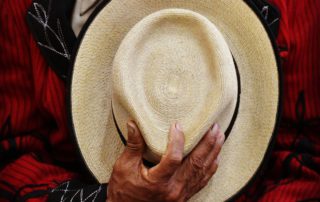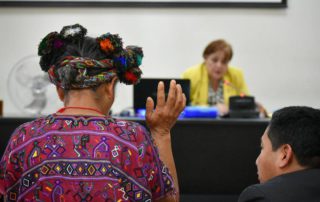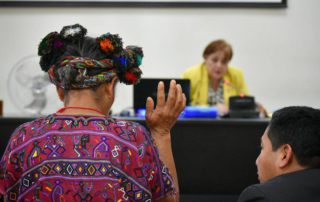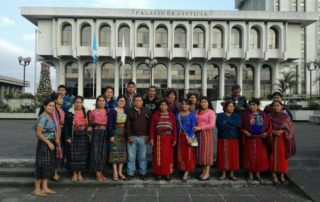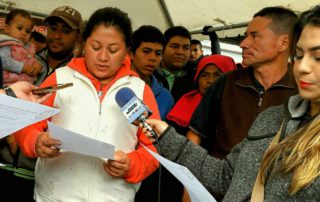Sepur Zarco
On February 26, 2016, indigenous women from the community of Sepur Zarco made history when they and their legal team successfully prosecuted former Guatemalan military officials for sexual and domestic slavery. Based largely on the testimonies of 15 Q’eqchi’ survivors, a Guatemalan tribunal convicted two men—former Military Commissioner Heriberto Valdez Asig and former Colonel Esteelmer Francisco Reyes Girón—of crimes against humanity for sexual and domestic slavery carried out at a military recreation center in the 1980s.
While the defendants faced charges for other crimes committed in the same context, including the forced disappearance of several of the women’s husbands, the trial holds national significance as the first transitional justice case in Guatemala to firmly center the experiences and impacts of sexual and domestic violence against women during the internal armed conflict.
When I became strong enough to be able to say what I had to say, I told the whole truth. That was what gave me strength…The moment came that we had been waiting for, for so long – to see justice.
In-depth NISGUA reports

Q’eqchi’ women set a precedent in Guatemala with first-ever conviction for sexual and domestic slavery.

Report-back from the “Guatemalan Women Healing Towards Justice” tour, featuring Maudi Tzay from the Alliance to Break Silence and Impunity.
In the early 1980s, communities in the Polochic Valley in Guatemala challenged wealthy landowners for legal titles to their ancestral lands. Around the same time, Guatemalan dictatorships constructed several military bases around the region of Sepur Zarco with the support of the U.S. The base built in Sepur Zarco was designated a military recreation center, where troops would return after taking 15-day rotations patrolling the surrounding mountains.
The soldiers at the Sepur Zarco military base disappeared men from the community who were seeking land titles, demonstrating the powerful connections between wealthy elites and the military. The women that survived them were then forced into sexual and domestic slavery for years. The trial illustrated how patriarchy and racism play out on women’s bodies in war. Grounded in the recognition that these systems endure today in Guatemala and the world over, the women survivors prosecuted this case as part of a multi-faceted strategy for social change. To do so they worked with a coalition of feminist, legal, and psychosocial organizations known as the Alliance to Break Silence and End Impunity.

Photo: CPR Urbana
The intergenerational struggle for access to and protection of land
After the verdict, the courts ordered 18 reparations to redress the physical, psychological, and material impacts of the violence. These include increased access to healthcare and education for survivors and community members, and legal reforms to reduce the barriers against survivors of sexual violence. The reparations focused on repairing harm, dissuading future violence, and community healing.
Survivors repeatedly testified to the psychological and economic impact of their husbands’ disappearances and how a lack of land access has perpetuated poverty. To carry out court ordered reparations, the Guatemalan national land registry must grant land titles and prioritize families of those forcibly disappeared while in the process of registering their land. Nonetheless, almost three years after the sentence, survivors have yet to receive titling.

In Solidarity
The Alliance to End Silence and Impunity called upon the international community to stand in solidarity with the women survivors of Sepur Zarco to ensure the legal system respects the sentence. The Alliance made direct requests for accompaniment, reporting, and advocacy to broaden the social impact of the case on a global scale.
Members of NISGUA responded to this call by gathering together to educate themselves and express solidarity with the survivors. We strengthened movements in Guatemala and the U.S. by drawing direct connections with local feminist struggles for gender justice and indigenous solidarity.
Latest from our blog
AJR members denounce harassment at genocide retrial
Photo credit: Jose Rodriguez After a holiday recess, the Ixil genocide case retrial will be heard again today. As Ixil witnesses come forward to once more share their experience of genocide publicly, [...]
En el 21° aniversario de la firma de los Acuerdos de Paz de Guatemala, AJR dice que el Estado aún les debe justicia a los sobrevivientes
En medio del nuevo juicio del caso por genocidio de los acusados José Efraín Ríos Montt y José Mauricio Rodríguez Sánchez, la Asociación para la Justicia y la Reconciliación (AJR), el Centro de Acción [...]
On 21st anniversary of Guatemalan Peace Accords signing, AJR says State still owes survivors justice
In the midst of the ongoing genocide retrial of José Efraín Ríos Montt and José Mauricio Rodriguez Sánchez, the Association for Justice and Reconciliation (AJR), the Center for Human Rights Legal Action (CALDH), and the Human Rights [...]
Solidarity Update: November 2017
News recap: Needham Congregational Church celebrates 30 years of U.S.-Guatemala solidarity; As Ríos Montt and Rodríguez Sánchez are retried, witnesses and survivors reaffirm 2013 genocide sentence; NISGUA report highlights grassroots strategies to preserve historical [...]
Youth add their voices to the cry for justice
Young Ixil university students stand in solidarity with genocide survivors outside of court.Photo credit: Ixil University students, Chemol txumb'al, FUNDEBASE, y AJR Friday, December 1, marked the seventh trial date since the [...]
Peaceful resistance movement and Xinca Parliament call for the permanent closure of the Escobal mine
Peaceful Resistance of Santa Rosa, Jalapa and Jutiapa member from Santa Rosa de Lima speaks to the press during a conference held at their second permanent resistance camp in front of the Guatemalan Constitutional [...]











